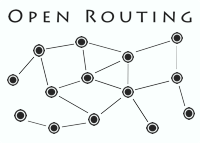PrefixManager - Route Advertisement¶
Introduction¶
PrefixManager is the module which keeps track of the prefixes originated from
local node. It advertises/withdraws prefixes to/from the network via KvStore.
Main functions of this module are:
Prefix operations, including advertising and withdrawing;
Route Origination;
Prefix redistribution(cross-AREA);
Inter Module Communication¶

There are three channels of information for managing route advertisements
[Producer] ReplicateQueue<DecisionRouteUpdate>: publish static routes to be programmed by local nodes. This queue is currently ONLY used for route origination purpose. Each static route is with a special typeCONFIG.[Producer] ReplicateQueue<KeyValueRequest>: send requests to set/clear key-values inKvStorerepresenting advertised/withdrawn routes.[Consumer] RQueue<PrefixEvent>: receive route advertising & withdrawing commands. Multiple sources within Open/R (LinkMonitor,PrefixAllocator,BgpRib) uses this channel to manage their advertisements. Each source is assigned and expected to use a unique prefix type.[Consumer] RQueue<DecisionRouteUpdate>: receive the computed (hence programmed) routes. The programmed routes are candidates for advertisements to other areas of which they’re not part of. This is termed as route re-distribution across the areas. Each RibRoute is converted into a route advertisement or withdraw with a special typeRIB.
In addition, PrefixManager will read routes to be originated from
OpenrConfig.originated_prefixes and stored them inside originatedPrefixDb_.
These routes supports route-aggregation logic with minimum_supporting_routes
knob. Each originated route maintains a count of its supporting routes.
Operations¶
To fulfill operations defined in previous section, PrefixManager updates its
local prefix database and interacts with KvStore:
[Advertise]: Send
Persistkey-value request tokvRequestQueue;[Withdraw]: Send
Clearkey-value request tokvRequestQueue;
See KvStore.md for how KvStore
handles these key-value requests.
PrefixManager supports the following operations:
ADD_PREFIXES=> Adds the list of prefixes provided as an argumentWITHDRAW_PREFIXES=> Withdraws the list of prefixes provided as an argumentWITHDRAW_PREFIXES_BY_TYPE=> Withdraws prefixes of the type provided as an argumentSYNC_PREFIXES_BY_TYPE=> Withdraws all current prefixes of the type provided and adds the list of prefixes providedGET_ALL_PREFIXES=> Returns all prefixes currently being advertisedGET_PREFIXES_BY_TYPE=> Returns all prefixes of the type provided currently being advertised
Above requests come from two places:
prefixUpdateRequestQueue-> request from internal modulespublic thrift APIs defined in
openr/if/OpenrCtrl.thrift-> request from external user. e.g. one can add and remove prefixes from thebreezecli. See CLI.md for more details
Deep Dive¶
Redistribute Prefix Workflow¶

For a route update (pfx1, node1, area1) from decisionRouteUpdatesQueue,
workflow is as follows:
run area1 egress policy
append area1 to area_stack, this is considered as a route cross area boundary
run area2 ingress policy, if accepted => inject to area2.
Selecting Unique Prefix Advertisement¶

A prefix can be requested to be advertised by multiple sources e.g. from configuration (originating route) or RIB (re-distributing route). However, only a single prefix information can be advertised to other nodes. We do so by following criteria:
Tie-breaking on Metrics
If still not unique, then tie-break on type (aka Source). The tie-breaking on source is statically defined in code
Let’s take the same (pfx1, node1, area1) example:
pfx1 is redistributed into area2, (pfx1(
RIB), me, area2)pfx1 is originated with type
BGP(pfx1(BGP), me, all)
To decide which prefix entry openr should originate. We’ll compare their
attributes first, if they are the same, BGP(3) win over RIB(6).
To conclude, attributes tie break happens in two places in openr:
in prefix Manager: same prefix of different typrs originated by me.
in decision: same prefix originated by different nodes.
